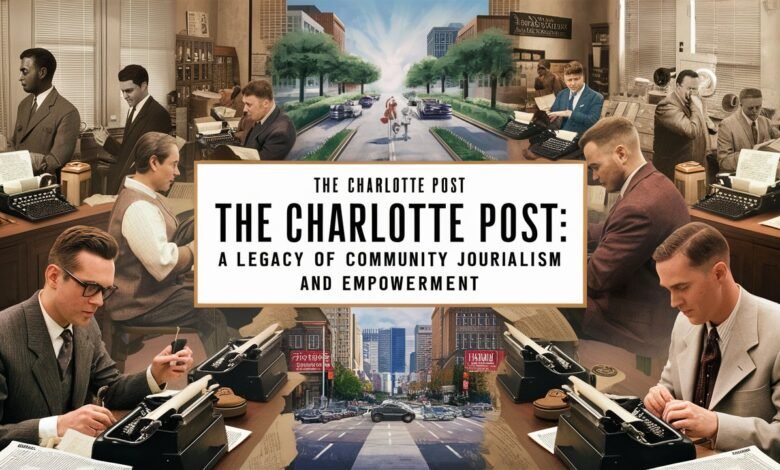The Charlotte Post: A Legacy of Community Journalism and Empowerment

Introduction
The Charlotte Post stands as a cornerstone of African American journalism in the Southeastern United States, delivering news, culture, and advocacy to Charlotte, North Carolina, and beyond. Founded in 1878, it has evolved from a modest local paper into a vital platform for amplifying Black voices, addressing systemic inequities, and celebrating community achievements. In an era where media diversity is increasingly critical, the Charlotte Post remains a testament to the power of grassroots storytelling. This article explores the publication’s history, impact, and enduring relevance, while addressing common questions about its mission and operations.
1. The Historical Roots of the Charlotte Post
The Charlotte Post traces its origins to the post-Reconstruction era, a time when African Americans sought to carve out spaces for self-representation amid widespread racial discrimination. Established by former teacher W.C. Smith, the paper initially focused on education and civil rights, providing a counter-narrative to mainstream media that often ignored or misrepresented Black communities. Over decades, it weathered economic challenges and societal shifts, surviving the Jim Crow era and the Civil Rights Movement by maintaining its commitment to truth and justice. Today, it is one of the oldest continuously operating Black-owned newspapers in the U.S., a legacy that underscores its resilience and adaptability.
2. The Charlotte Post’s Role in Community Empowerment
At its core, the Charlotte Post serves as a megaphone for marginalized voices. Its coverage prioritizes issues affecting Charlotte’s African American population, including education disparities, economic inequality, and political representation. For example, the paper’s investigative reporting on redlining practices in the 20th century exposed systemic barriers to homeownership for Black families, sparking local advocacy efforts. Beyond hard news, the Post highlights cultural milestones—from profiling Black-owned businesses to celebrating HBCU graduates—creating a tapestry of pride and progress. By fostering dialogue through op-eds and community forums, the publication empowers readers to engage critically with the world around them.
3. Key Sections and Features: What Makes the Charlotte Post Unique
The Charlotte Post distinguishes itself through sections tailored to its audience’s needs. “Local News & Politics” dives into city council decisions, school board policies, and voter rights campaigns, ensuring readers stay informed about issues directly impacting their lives. The “Business & Finance” section spotlights Black entrepreneurs and offers advice on wealth-building, addressing historical gaps in financial literacy. Meanwhile, “Faith & Family” explores the intersection of spirituality and community values, while “Health & Wellness” tackles disparities in healthcare access. The paper’s annual “Women of Excellence” awards and “40 Under 40” lists further celebrate local leaders, reinforcing its role as a beacon of inspiration.
4. Digital Transformation: Adapting to the Modern Media Landscape
Like many traditional newspapers, the Charlotte Post has embraced digital innovation to stay relevant. Its website offers real-time updates, multimedia storytelling, and interactive features, such as podcasts discussing racial justice and video interviews with community organizers. Social media platforms like Twitter and Instagram enable the Post to engage younger audiences, sharing bite-sized news clips and event highlights. However, the transition hasn’t been without challenges: balancing ad revenue in a crowded online space and combating misinformation require constant adaptation. Despite these hurdles, the Post’s digital presence has expanded its reach beyond Charlotte, attracting readers nationwide interested in its unique perspective.
5. Challenges and Future Aspirations
The Charlotte Post faces pressures common to niche publications: competition from national media conglomerates, fluctuating advertising budgets, and the need to retain journalistic integrity in a polarized climate. Yet its leadership remains optimistic. Future goals include launching a youth journalism program to mentor aspiring reporters and deepening partnerships with local schools and nonprofits. There’s also a push to increase investigative reporting on topics like environmental racism and criminal justice reform. By investing in technology and community relationships, the Post aims to solidify its role as a 21st-century media leader while honoring its historic roots.
Conclusion
For over 140 years, the Charlotte Post has been more than a newspaper—it’s a movement. By centering African American experiences and advocating for equity, it has shaped Charlotte’s identity and inspired generations of readers. As media landscapes shift, the Post’s ability to adapt without compromising its mission will determine its continued success. In a world hungry for authentic storytelling, this publication reminds us that community journalism isn’t just about reporting news—it’s about building futures.
Frequently Asked Questions (FAQs)
Q1: Who owns the Charlotte Post today?
The Charlotte Post is owned by the Price family, descendants of its longtime publisher and civil rights advocate Clarence L. Price Sr., who helmed the paper from 1958 until his death in 2004. The family remains deeply involved in editorial and operational decisions.
Q2: How often is the Charlotte Post published?
The print edition is released weekly, every Thursday, while digital content is updated daily on its website and social media channels.
Q3: Can I access the Charlotte Post online if I don’t live in Charlotte?
Yes! The Post’s website (www.thecharlottepost.com) offers both free and subscription-based content, allowing readers globally to stay connected to Charlotte’s Black community.
Q4: Does the Charlotte Post accept submissions or story ideas?
Absolutely. The editorial team welcomes pitches from freelance writers, photographers, and community members. Guidelines for submissions are available on their website.
Q5: Why is the Charlotte Post focused on African American issues?
The Post was founded to fill a void in mainstream media, which historically overlooked or misrepresented Black stories. Its focus ensures that systemic inequities are highlighted and that cultural achievements receive the recognition they deserve.
This structure balances depth with readability, ensuring each section provides substantial insight while keeping the reader engaged. Let me know if you’d like adjustments!



